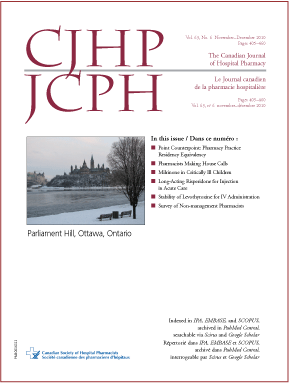Evaluating Appropriateness of Prescribing of Long-Acting Risperidone for Injection in Acute Care Settings
DOI:
https://doi.org/10.4212/cjhp.v63i6.962Keywords:
risperidone, antipsychotic agents, long-acting medications, delayed-action preparations, retrospective study, physicians’ practice patterns, rispéridone, antipsychotiques, médicaments à action prolongée, preparations retard, étude retrospective, habitudesAbstract
Background: Long-acting risperidone for injection is a second-generation antipsychotic indicated for the treatment of schizophrenia and related psychotic disorders. It is a relatively new agent with pharmacokinetic and dosing properties unlike those of conventional long-acting antipsychotic drugs administered by injection.
Objective: To determine the proportion of patients for whom long-acting risperidone for injection was prescribed appropriately in acute care settings in the Fraser Health Authority of British Columbia, according to the following 4 criteria: approved indication for therapy, 2-week dosing intervals, dose increases no sooner than every 4 weeks, and initial overlap supplementation with another antipsychotic for at least 3 weeks. A variety of other variables, including documented approval under special authority from the provincial drug coverage program, length of hospital stay, initial dose of risperidone, and total number of doses, were assessed as secondary outcomes.
Methods: A chart review was conducted for all patients for whom therapy with long-acting risperidone for injection was prescribed during stays in 8 acute care hospitals between July 1, 2007, and July 22, 2008. The appropriateness of prescribing was assessed according to the 4 prespecified criteria.
Results: Long-acting risperidone for injection was prescribed for 116 patients during the study period, and 82 of these started therapy and were included in the evaluation. The primary outcome could not be assessed for 27 of these 82 patients, because they were discharged early, and data for some or all of the 4 criteria were not available. For 33 (60%) of the 55 remaining patients, long-acting risperidone for injection had been prescribed appropriately. In contrast, for 22 (40%) of the patients, prescription of risperidone was deemed inappropriate because of failure to meet at least 1 of the 4 criteria. Premature escalation of the dose and inadequate overlap with antipsychotic supplementation were the most common reasons for designation of the prescription as inappropriate.
Conclusions: Opportunities exist to improve prescribing practices for long-acting risperidone for injection in acute care institutions in this health authority.
RÉSUMÉ
Contexte : La rispéridone injectable à action prolongée est un antipsychotique de deuxième generation indiqué pour le traitement de la schizophrénie et des troubles psychotiques associés. Il s'agit d'un agent relativement nouveau ayant un comportement pharmacocinétique et des caractéristiques posologiques différentes des antipsychotiques classiques injectables à action prolongée.
Objectif : Déterminer la proportion de patients à qui l'on a prescript de la rispéridone injectable à action prolongée de façon appropriée en milieu de soins de courte durée à la Fraser Health Authority en Colombie Britannique, sur la base des quatre principaux parameters d'évaluation suivants : indication approuvée dans cette maladie, intervalles posologiques de deux semaines, augmentation de la dose à des intervalles d'au moins quatre semaines et administration concomitante initiale d'un autre antipsychotique pendant au moins trois semaines. Les paramètres d'évaluation secondaires comprenaient notamment l'approbation consignee et accordée en vertu de droits spéciaux par le régime provincial d'assurance-médicaments, la durée de l'hospitalisation, la dose initiale de rispéridone et le nombre total de doses administrées.
Méthodes : Une analyse des dossiers médicaux de tous les patients à qui la rispéridone injectable à action prolongée a été prescrite durant leur hospitalisation dans huit hôpitaux de soins de courte durée entre le 1er juillet 2007 et le 22 juillet 2008 a été effectuée. La pertinence de la prescription du médicament a été évaluée en fonction des quatre critères prédéfinis.
Résultats : Un total de 116 patients ont reçu une prescription de rispéridone injectable à action prolongée durant la période de l'étude, et 82 de ces patients ont commencé le traitement et ont fait l'objet de l'évaluation. De ces 82 patients, 27 n'ont pas pu être évalués pour ce qui est des principaux parameters d'évaluation, car ils ont reçu leur congé tôt et les données pour certains ou pour les quatre principaux parameters d'évaluation n'étaient pas disponibles. Chez 33 (60 %) des 55 patients restants, la rispéridone injectable à action prolongée a été prescrite de façon appropriée. Par contraste, chez 22 (40 %) de ces patients, la prescription de rispéridone a été jugée inappropriée, car elle ne satisfaisait pas à au moins un des quatre critères. L'augmentation prématurée de la dose et l'administration concomitante inadequate d'un autre antipsychotique étaient les raisons les plus courantes pour juger la prescription inappropriée.
Conclusions : Il existe des occasions d'améliorer les habitudes de prescription de la rispéridone injectable à action prolongée dans les établissements de soins de courte durée dans cette régie de la santé.Downloads
Downloads
Issue
Section
License
After publication of a manuscript in the CJHP, the authors of the manuscript must obtain written permission from the CSHP (publications@cshp.ca) before reproducing any text, figures, tables, or illustrations from the work in future works of their own. If a submitted manuscript is declined for publication in the CJHP, all said rights shall revert to the authors. Please note that any forms (e.g., preprinted orders and patient intake forms) used by a specific hospital or other health care facility and included as illustrative material with a manuscript are exempt from this copyright transfer. The CJHP will require a letter from the hospital or health care facility granting permission to publish the document(s).
Copyright © Canadian Society of Hospital Pharmacists.









